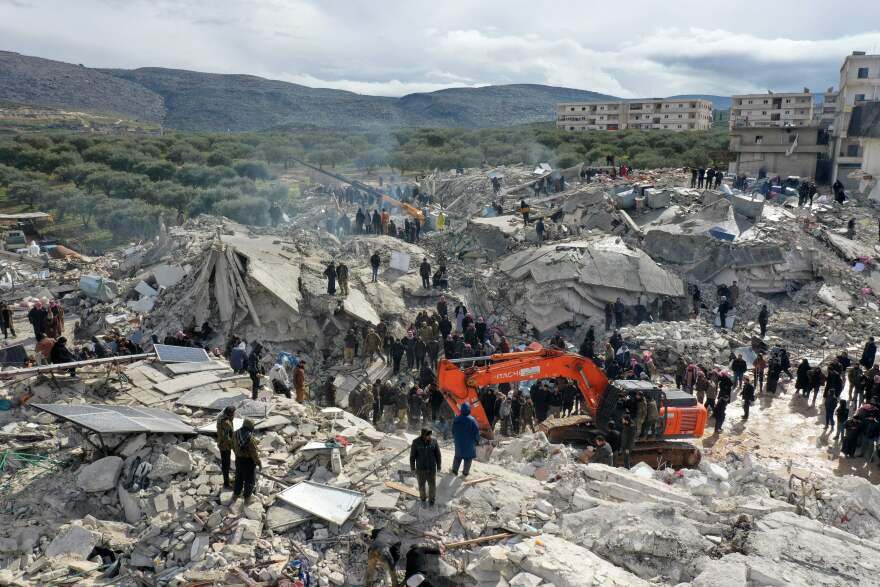Updated February 7, 2023 at 1:19 PM ET
Much of the destruction and death from Monday's 7.8-magnitude earthquake in Turkey lies across the border in northern Syria, a region already ravaged by more than a decade of civil war and the myriad crises that have flowed from it.
Syrian officials have already reported at least 656 people dead in government-held areas of the country, according to the Associated Press. In northwest Syria, a region held by rebels, aid groups operating there said at least 450 people died, with many hundreds injured, according to the AP.
And as the death toll continues to rise, residents and aid groups in the country's northern region have described disastrous scenes of collapsed buildings, packed hospitals, desperate parents clutching unconscious children and frantic rescue workers digging through rubble.
"This is the last thing people need in Syria," said Jomah Al Qassim, a Syrian aid worker currently across the border in Gaziantep, Turkey.
Since Syria's civil war began in 2011, unending disasters have beset this region of the country – thousands of civilian deaths, extensive infrastructure damage, shortages of water and electricity, the spread of COVID-19 and cholera. Al Qassim described it as "an accumulation, a heap, of crises."
"People were already exhausted," he said.
"What happened today is harder than all the years that have passed, from bombing and everything we've gone through," said Hamid Qutaymi, a worker with Syria Civil Defense, the Syrian volunteer aid organization also called the White Helmets, who spent Monday working as a first responder.
NW #Syria in a state of catastrophe after 7.8 magnitude #earthquake. Destruction, devastation, and collapse of buildings. Hundreds of injuries, dozens of deaths, many trapped under the rubble or stranded in the winter cold. We call on the international community to take action. pic.twitter.com/rtzqRJa8IP
— The White Helmets (@SyriaCivilDef) February 6, 2023
Syria's civil war began in 2011 when protesters, inspired by the success of uprisings in the Middle East and North Africa, called for an end to the repressive regime of Bashar Assad. But Assad ordered a violent crackdown, launching the civil war that is still active today. His forces have now retaken control of most of the populated parts of the country. But some areas – like in Idlib – remain under opposition control.
More than 300,000 civilians were killed from March 2011 through March 2021, amounting to 1.5% of the country's population, according to a report published by the United Nations human rights office last year.
A ceasefire brokered in early 2020 has cooled the most heated fighting in the last few years. But five foreign military forces and a number of other armed groups are still active inside the country, and humanitarian groups report that thousands of civilians continue to die each year as a result.
The conflict has irreparably altered daily life in the wartorn parts of the country, including northern Syria. In 2018, the U.N. estimated that the war had caused more than $120 billion in damage to roads, infrastructure and homes. In 2017, the World Bank estimated that nearly a third of all homes in Aleppo and Idlib had been damaged or destroyed in the conflict.
At least half of the country's prewar population has been displaced, either internally or as refugees, according to the U.N.; of those still inside Syria, the U.N. estimates that 90% live in poverty. Prices of food have skyrocketed. Drought, high temperatures and the widespread destruction of water infrastructure have combined to cause a water crisis, which in turn has exacerbated crises with electricity and healthcare.

Now, Monday's earthquake has added yet another layer of misery.
"We're at the pinnacle of despair right now," said Raed Saleh, director of the White Helmets.
For years during the Syrian civil war, the White Helmets worked in opposition areas to rescue civilians from the aftermath of airstrikes. Now, they and other aid groups are racing to search for survivors in the wreckage of buildings brought down by the earthquake.
The damage from the earthquake is much more widespread than that of any one airstrike, Saleh said. But at least today the search and rescue teams could operate without the usual fear of a follow-up airstrike, he said – a grim positive.
Prolonging the misery for families forced out of their homes was the winter weather, with rain expected into the evening Monday, followed by cold weather dipping below freezing at night.
Still, as aftershocks continued hours after the original earthquake, aid groups were urging residents to not return to damaged homes until the buildings could be inspected for structural integrity.
"The situation outside is also very stormy and rainy, with snow as well. But we told them their safety is more important," said Saleh.
The number of dead and injured had already overwhelmed hospitals in the affected area, said Ahmed Ghandour, a doctor working in Idlib province.
"There is no space for all of them," he said, adding that soon there would be a lack of medical supplies due to the sheer scale of casualties. "Inshallah, we will do all our best to treat them, to help more people."
Additional reporting by NPR's Ruth Sherlock and Jawad Rizkallah in Beirut. contributed to this story
Copyright 2023 NPR. To see more, visit https://www.npr.org.




